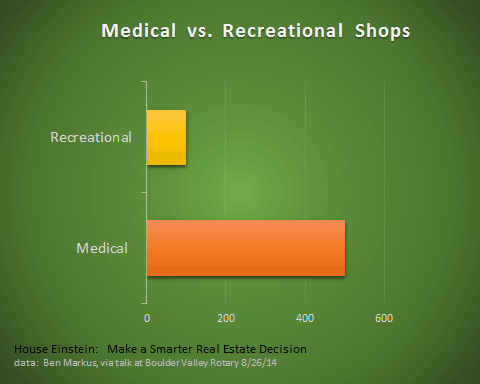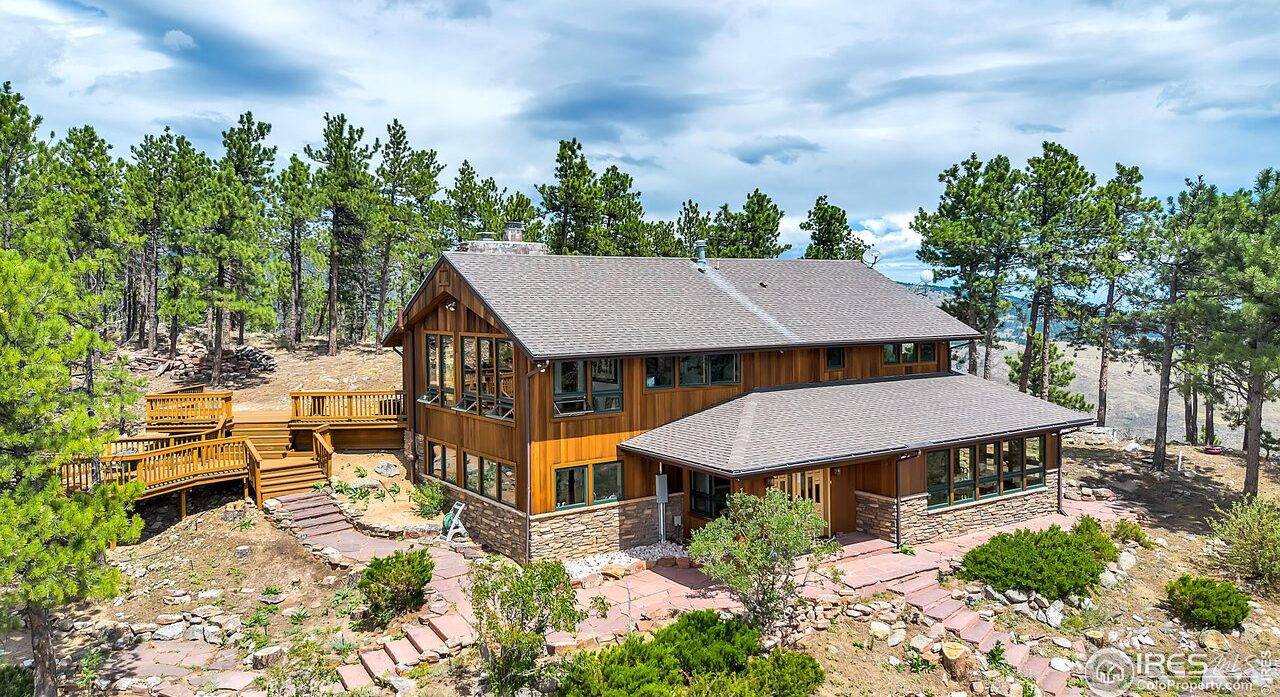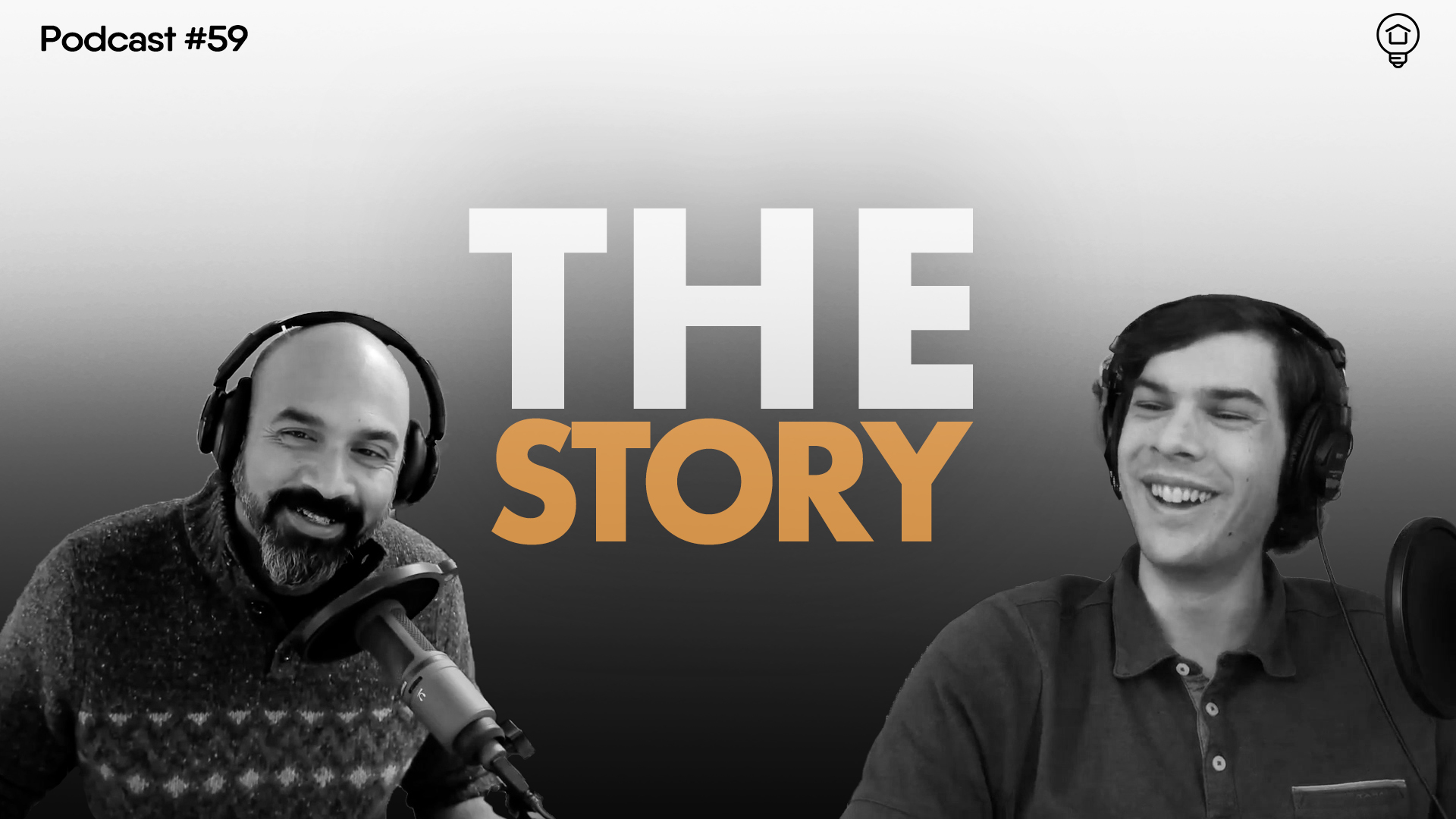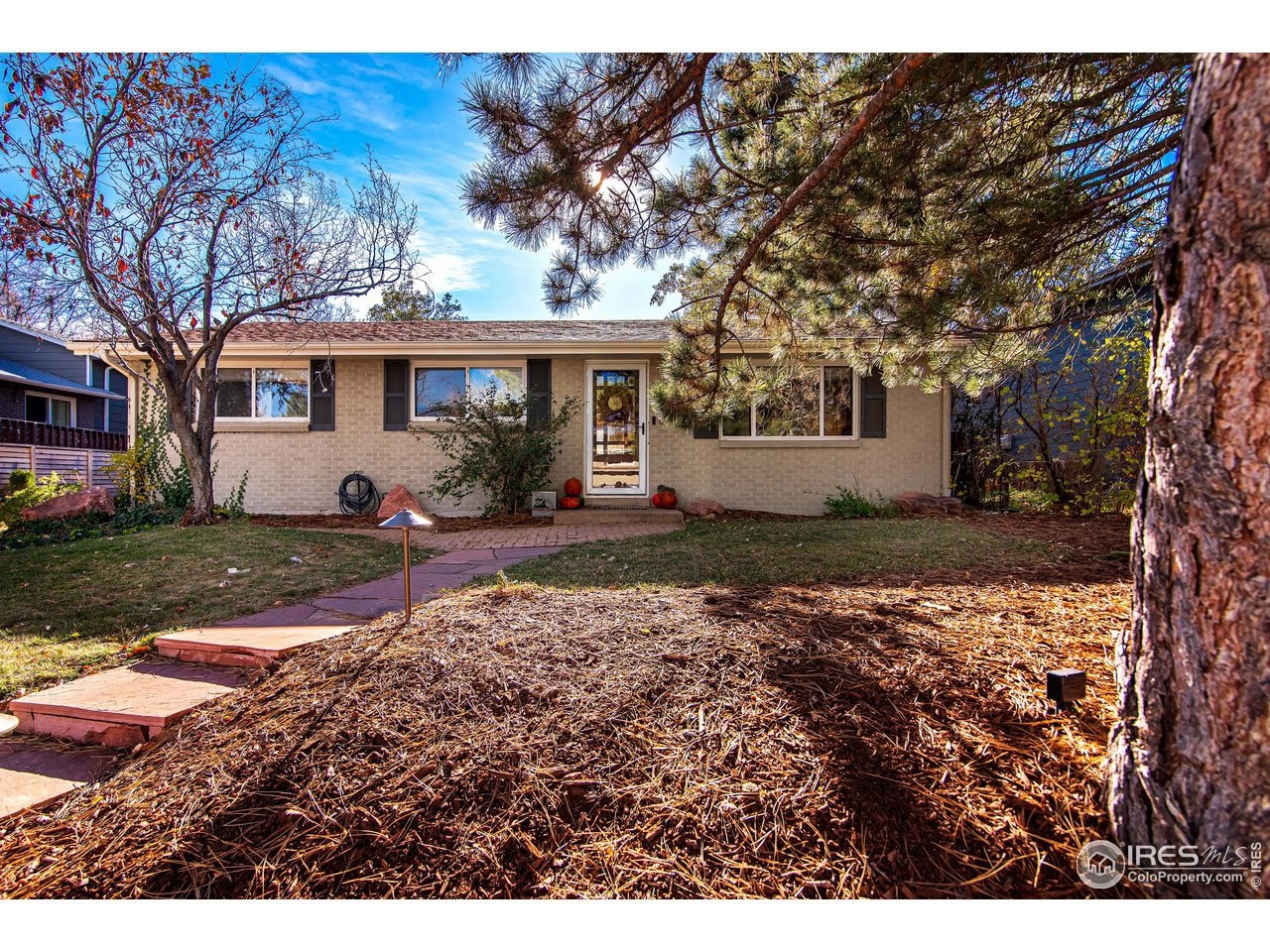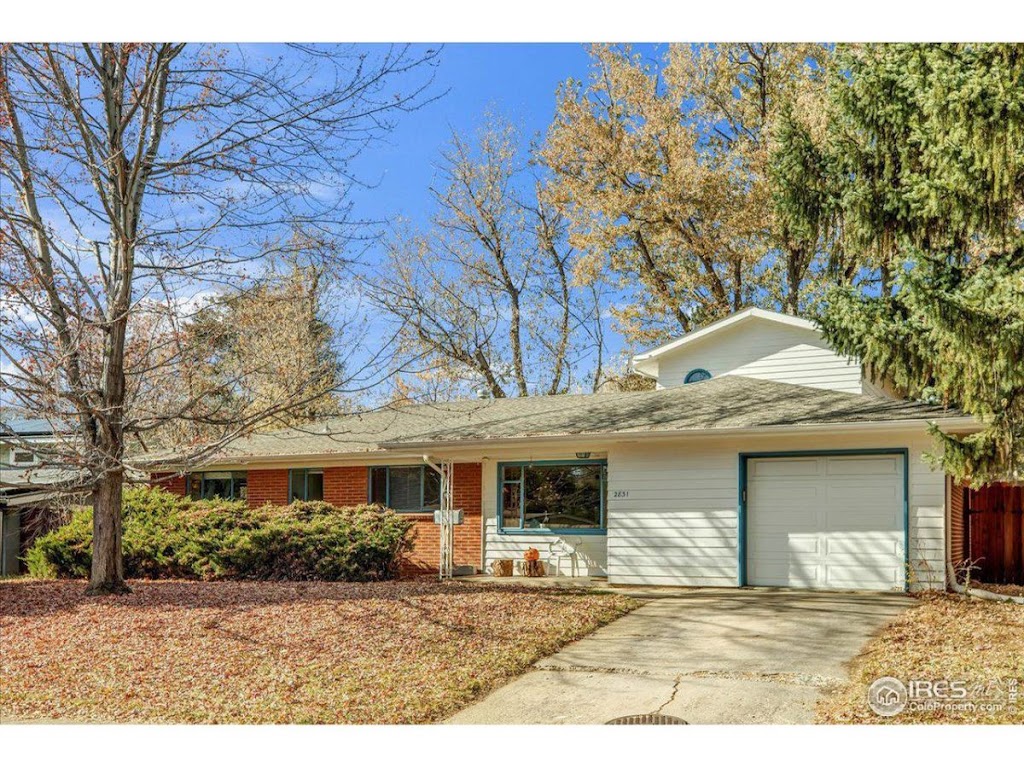Understanding the Marijuana Market in Colorado [Analyze This]
by Osman Parvez
Dude, where’s my tax revenue?
Eight months have passed since recreational Marijuana became legal in Colorado. It’s a big deal for our state and local economy. It has cultural impacts. The rest of the country is watching.
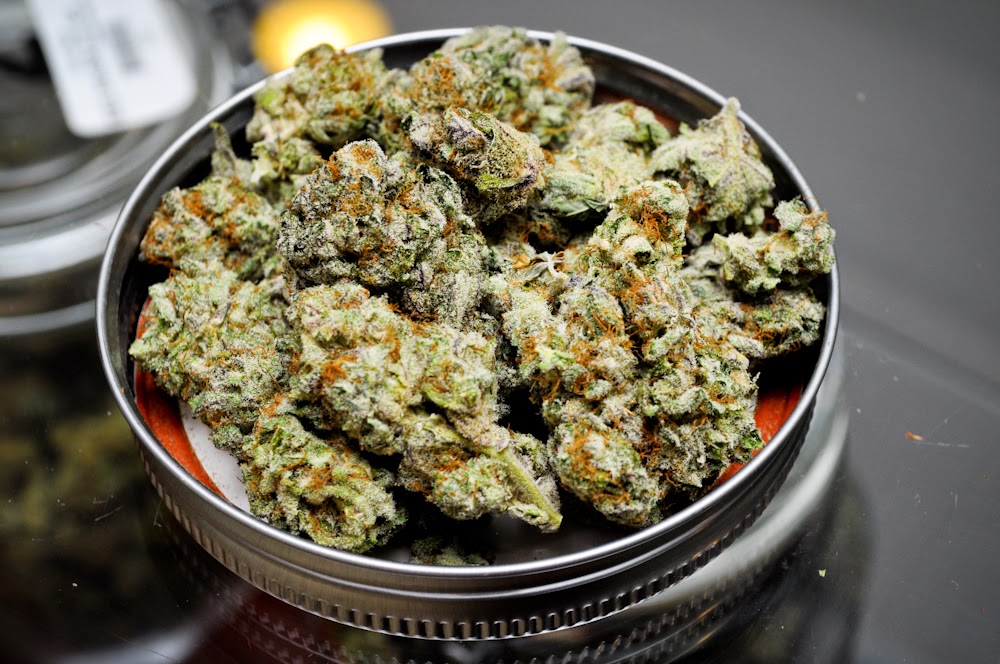 |
| future tax revenue? |
Today, the majority of Americans favor legalization1 but medical marijuana is legal in only 23 states. Recreational pot is legit only Colorado and Washington state (map).
Implementation is already being called a success2 and despite the hoopla, Colorado has not become the Amsterdam of the Rocky Mountain region. Sure, you catch the occasional whiff of pungent herb in the air. I swear people are also driving slower. Otherwise things seem pretty much the same. Meanwhile, violent and property crime in Denver has dropped 10.6 percent.
Wondering what it’s like to buy pot in Boulder? You might enjoy a little story written by a visitor from Amsterdam. Prepare to be underwhelmed.
The Numbers
Here are some facts and figures to get your head around.3
The state has left it up to the municipalities to determine if they’ll allow recreational shops. Some, like Colorado Springs, are still debating whether to allow recreational marijuana and how to regulate it. Denver was an early adopter and currently claims 90% of recreational shops. As cities and towns continue to enact their own rules, expect Denver’s dominance to fade somewhat.
The number of recreational pot shops remains well below medical shops, state-wide. This is largely driven by the fact that the cost for recreational is much higher than medical and it has been very easy for Colorado residents to obtain a medical card. Recreational pot consumers are largely tourists. Resident consumers are obtaining their marijuana from medical shops or from their long established black market dealer.
About 16,000 medical marijuana cards have been issued in Colorado. This number has essentially remained the same since recreational pot was legalized. It costs only $16 to obtain a medical card, in addition to the cost of visiting the doctor. It turns out there a lot of residents in Colorado with migraines.
Tax is one of the biggest factors. Colorado currently taxes recreational pot at 40% but only levies a 3% tax on medical marijuana. Municipalities are free to enact their own additional taxes. The City of Boulder, for example, taxes growing at 5% and tacks on another 3.5% for retail sales.
Colorado saw a 20% increase in sales for June compared to the previous month and $20MM in taxes have been raised due to pot this year, far below what was expected.3 Meanwhile, debate continues over regulation and taxation schemes.4
Because banks are scared to handle marijuana business, tons of cash is floating around. Many pot shop owners and managers are carrying firearms to protect themselves. Not a good combination. The long arm of the Federal Government continues to cast a dark shadow. Plus, we’re probably missing out on some tax revenue because of sketchy accounting (typical with cash businesses).
The Real Estate Perspective
There isn’t any evidence of people moving to Colorado specifically for recreational pot, although there are stories about people coming here for medical reasons. Meanwhile, there is anecdotal evidence that some home owners are reaping in cash by hosting out of town visitors via AirBNB and VRBO.
Due diligence tip: if you’re planning to invest in property and turn over short term rentals, review your HOA rules carefully. I know of one resident (a Realtor, no less) who has found herself in hot water by Air Bnb’ing her downtown Boulder condo.
On the commercial side of things, Denver warehouses are now extremely expensive. Boulder warehouses, too. Good luck finding one.
—
As always, your referrals are deeply appreciated.
—
1 “The Great Pot Experiment,” The Economist, July 12, 2014.
2. “Colorado’s Rollout of Legal Marijuana Is Succeeding; A Report on the State’s Implementation of Legalization.” John Hudak, The Brookings Institute, July, 2014.
3 Markus, Ben. “Legal Marijuna: Six Months Later.” Presentation to Boulder Valley Rotary. August 25, 2014.
4 “Weed Control; an Incoherent Plan for Regulating.” The Wall Street Journal, August 5, 2014.
Understanding the Marijuana Market in Colorado [Analyze This]
by Osman Parvez
Dude, where’s my tax revenue?
Eight months have passed since recreational Marijuana became legal in Colorado. It’s a big deal for our state and local economy. It has cultural impacts. The rest of the country is watching.
 |
| future tax revenue? |
Today, the majority of Americans favor legalization1 but medical marijuana is legal in only 23 states. Recreational pot is legit only Colorado and Washington state (map).
Implementation is already being called a success2 and despite the hoopla, Colorado has not become the Amsterdam of the Rocky Mountain region. Sure, you catch the occasional whiff of pungent herb in the air. I swear people are also driving slower. Otherwise things seem pretty much the same. Meanwhile, violent and property crime in Denver has dropped 10.6 percent.
Wondering what it’s like to buy pot in Boulder? You might enjoy a little story written by a visitor from Amsterdam. Prepare to be underwhelmed.
The Numbers
Here are some facts and figures to get your head around.3
The state has left it up to the municipalities to determine if they’ll allow recreational shops. Some, like Colorado Springs, are still debating whether to allow recreational marijuana and how to regulate it. Denver was an early adopter and currently claims 90% of recreational shops. As cities and towns continue to enact their own rules, expect Denver’s dominance to fade somewhat.
The number of recreational pot shops remains well below medical shops, state-wide. This is largely driven by the fact that the cost for recreational is much higher than medical and it has been very easy for Colorado residents to obtain a medical card. Recreational pot consumers are largely tourists. Resident consumers are obtaining their marijuana from medical shops or from their long established black market dealer.
About 16,000 medical marijuana cards have been issued in Colorado. This number has essentially remained the same since recreational pot was legalized. It costs only $16 to obtain a medical card, in addition to the cost of visiting the doctor. It turns out there a lot of residents in Colorado with migraines.
Tax is one of the biggest factors. Colorado currently taxes recreational pot at 40% but only levies a 3% tax on medical marijuana. Municipalities are free to enact their own additional taxes. The City of Boulder, for example, taxes growing at 5% and tacks on another 3.5% for retail sales.
Colorado saw a 20% increase in sales for June compared to the previous month and $20MM in taxes have been raised due to pot this year, far below what was expected.3 Meanwhile, debate continues over regulation and taxation schemes.4
Because banks are scared to handle marijuana business, tons of cash is floating around. Many pot shop owners and managers are carrying firearms to protect themselves. Not a good combination. The long arm of the Federal Government continues to cast a dark shadow. Plus, we’re probably missing out on some tax revenue because of sketchy accounting (typical with cash businesses).
The Real Estate Perspective
There isn’t any evidence of people moving to Colorado specifically for recreational pot, although there are stories about people coming here for medical reasons. Meanwhile, there is anecdotal evidence that some home owners are reaping in cash by hosting out of town visitors via AirBNB and VRBO.
Due diligence tip: if you’re planning to invest in property and turn over short term rentals, review your HOA rules carefully. I know of one resident (a Realtor, no less) who has found herself in hot water by Air Bnb’ing her downtown Boulder condo.
On the commercial side of things, Denver warehouses are now extremely expensive. Boulder warehouses, too. Good luck finding one.
—
As always, your referrals are deeply appreciated.
—
1 “The Great Pot Experiment,” The Economist, July 12, 2014.
2. “Colorado’s Rollout of Legal Marijuana Is Succeeding; A Report on the State’s Implementation of Legalization.” John Hudak, The Brookings Institute, July, 2014.
3 Markus, Ben. “Legal Marijuna: Six Months Later.” Presentation to Boulder Valley Rotary. August 25, 2014.
4 “Weed Control; an Incoherent Plan for Regulating.” The Wall Street Journal, August 5, 2014.
Share This Listing!
More about the author
Osman Parvez
Owner & Broker at House Einstein as well as primary author of the House Einstein blog with over 1,200 published articles about Boulder real estate. His work has appeared in the Wall Street Journal and Daily Camera.
Osman is the primary author of the House Einstein blog with over 1,200 published articles about Boulder real estate. His work has also appeared in many other blogs about Boulder as well as mainstream newspapers, including the Wall Street Journal and Daily Camera. Learn more about Osman.
Work with
House Einstein
Thinking about buying or selling and want professional advice?
Call us at 303.746.6896
Your referrals are deeply appreciated.




